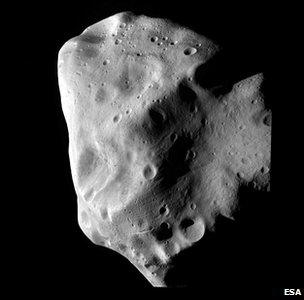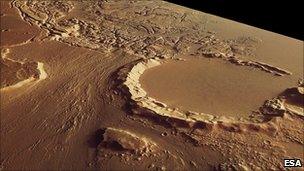European call for next major space mission
- Published

The Cosmic Vision programme addresses big themes in space science
The call will go out to Europe's scientists next week to come up with ideas for the next great space mission.
The European Space Agency (Esa) will fund the winning proposal to the tune of several hundred million euros.
The satellite - or even flotilla of craft if that is what the best concept requires - would be launched in the 2020-22 time frame.
The bids must address fundamental, but fairly broad, questions about the Universe and our place within it.
Esa's science director, Professor David Southwood, told BBC News: "The simplest way to describe it is this: how did our Universe evolve to us; how did we get from the Big Bang to today? And then the other big idea is, how unique is our planet and in particular our position on it; is there life elsewhere?"
He was speaking at this year's Farnborough International Airshow.
'Cab rank'
Esa plans many of its future science missions under a programme called Cosmic Vision.

Asteroids are currently subjects of intense interest
This is already in the late stages of selecting two "medium class" ventures to launch in 2017/18. Three concepts are competing for just two launch slots - a mission to study the "dark Universe" (Euclid); a sophisticated telescope to hunt for planets (Plato); and a satellite to study the Sun up close (Solar Orbiter).
Whichever of these three fails to make the final selection, due to be made next summer, will fall back into the new call, and fight for the right to fly anew.
It is also likely that several ideas that fell at an earlier selection hurdle will re-submit in some form to the new opportunity. The current fascination for asteroids means it is almost certain that a sample return idea will be in the mix.
Esa also has a "large class" competition in full swing. The launch window for this more expensive - and more complex - mission is 2020. Professor Southwood said he wanted the new medium class opportunity to be ready to launch in this year as well, to maintain Esa's mission momentum should the large class venture be delayed.
"We want something limbered up and ready to go," explained Professor Southwood.
"It's making sure we have a 'cab rank' and if one of the cabs drops out for a moment, there's another that can drive around and pick up."
Starter's orders
National scientists have already begun the process of developing concepts to submit, even before the formal call has gone out.
In the UK, community meetings have been organised at the Royal Astronomical Society in London.
Ideas debated have included missions to comets and the outer planets, and even efforts to study Earth's auroras (Northern and Southern Lights) and particle acceleration at the Sun.

The Red Planet is always a popular destination
"We're all trying to work out the sorts of missions that are likely to have the best chance of winning, and ones the UK can play prominent roles in," said Dr Lucie Green from the Mullard Space Science Laboratory.
A colleague, Dr Andrew Coates, is promoting a mission called FAME-P (Fast Auroral Mars Explorer).
This is a multi-purpose, multi-probe mission to the Red Planet that would image auroras as well as studying surface weather and other atmospheric activity.
"In addition to this, we want a surface element," Dr Coates told BBC News.
"We would have penetrators going down to the surface of Mars. For years, people have wanted to do seismological measurements at Mars; the idea of a network of seismometers has been around for a long time.
"The most cost-effective idea would be to have four penetrators at different points on the surface. We've done a fair amount of the development of the technology for this."
Proposals for the "M3" call will need to be submitted in December. A process of down-selection will occur with the eventual winner likely to be announced in 2012.
Esa has cost-capped its funding of medium class missions at 470m euros. Member states provide instruments for the mission spacecraft from their own national space budgets.